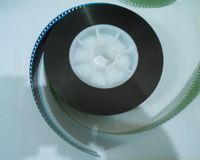| Welcome to Sprocket School! This project is maintained by volunteer editors. Learn more about how this works. |
Trailers: Difference between revisions
Jump to navigation
Jump to search
(Created page with "'''Trailers''' can be both practical and fun to watch, but they can also be inconvenient. Here are some tips! ==How to show film trailers== * Transfer from trailer core to re...") |
JesseCrooks (talk | contribs) (Fixed "Snipe" link to redirect to correct page.) |
||
| (14 intermediate revisions by one other user not shown) | |||
| Line 1: | Line 1: | ||
'''Trailers''' | '''Trailers''' deserve the same care as a feature film print, and if properly handled and stored they can be projected many times over! Treat with love, you might have something rare and special on your hands. Below are some tips on how to deal with film prints of the shorter persuasion, such as trailers and [[snipe|snipes]]. | ||
==How to store trailers== | ==How to store trailers== | ||
| Line 12: | Line 8: | ||
Here are a few things you can do to extend the life of your trailers: | Here are a few things you can do to extend the life of your trailers: | ||
*First identify what type of film base you are dealing with (either acetate or polyester, most likely not nitrate) and separate them. See [[Film base]] for information on how to tell the difference. | |||
*Keep trailers wound onto 3" cores rather than 2" or 1" cores, which were never designed for long term archival storage. Cores under 3" will eventually cause the end of your trailer to warp and drift in and out of focus during projection, even new polyester trailers can become badly warped after a few years of living on a 1" trailer core. | *Keep trailers wound onto 3" cores rather than 2" or 1" cores, which were never designed for long term archival storage. Cores under 3" will eventually cause the end of your trailer to warp and drift in and out of focus during projection, even new polyester trailers can become badly warped after a few years of living on a 1" trailer core. | ||
| Line 20: | Line 18: | ||
*Store trailers in archival cans on 3" cores (you can fit about 7 to a can, or you can build them up into trailer reels) in a cool, dry area. Some great information on caring for film outside of an archive setting can be found at [http://www.filmforever.org filmforever.org] | *Store trailers in archival cans on 3" cores (you can fit about 7 to a can, or you can build them up into trailer reels) in a cool, dry area. Some great information on caring for film outside of an archive setting can be found at [http://www.filmforever.org filmforever.org] | ||
==How to properly project film trailers== | |||
* Transfer from trailer core to reel using a [[trailer flange]] if you have one. | |||
* Use black leader to separate | |||
* Pay attention to trailers of different [[film base]]s as you may need to readjust your focus between them. | |||
==Resources== | |||
*[http://www.tuscancorp.com/ Tuscan film storage cans] | |||
*[http://stilcasing.com/analog_film_preservation.html Stil film storage cans] | |||
*[http://goldbergbrothers.com/ Goldberg reels and trailer flanges] | |||
*[http://dancan.dk/ Dancan film cans and cores] | |||
*[https://www.christys.net/ Christys cores, tape,leader, cans] | |||
*[https://www.imagepermanenceinstitute.org/imaging/ad-strips Vinegar syndrome test strips from the Image Permanence Institute] | |||
==See Also== | ==See Also== | ||
Latest revision as of 20:59, 8 February 2019
Trailers deserve the same care as a feature film print, and if properly handled and stored they can be projected many times over! Treat with love, you might have something rare and special on your hands. Below are some tips on how to deal with film prints of the shorter persuasion, such as trailers and snipes.
How to store trailers

If you're a projectionist, theater manager, or collector, you've probably accumulated at least a few trailers, which probably live in a cardboard box somewhere in the projection booth. That might be fine for a few weeks, but it's no solution to long term storage.
Here are a few things you can do to extend the life of your trailers:
- First identify what type of film base you are dealing with (either acetate or polyester, most likely not nitrate) and separate them. See Film base for information on how to tell the difference.
- Keep trailers wound onto 3" cores rather than 2" or 1" cores, which were never designed for long term archival storage. Cores under 3" will eventually cause the end of your trailer to warp and drift in and out of focus during projection, even new polyester trailers can become badly warped after a few years of living on a 1" trailer core.

- For trailers that have already been cut at their heads and tails, wrap a 18" length of leader around the trailer and tape it to itself as pictured, this will insure that no tape residue ends up on the trailer itself.
- Store trailers in archival cans on 3" cores (you can fit about 7 to a can, or you can build them up into trailer reels) in a cool, dry area. Some great information on caring for film outside of an archive setting can be found at filmforever.org
How to properly project film trailers
- Transfer from trailer core to reel using a trailer flange if you have one.
- Use black leader to separate
- Pay attention to trailers of different film bases as you may need to readjust your focus between them.
Resources
- Tuscan film storage cans
- Stil film storage cans
- Goldberg reels and trailer flanges
- Dancan film cans and cores
- Christys cores, tape,leader, cans
- Vinegar syndrome test strips from the Image Permanence Institute